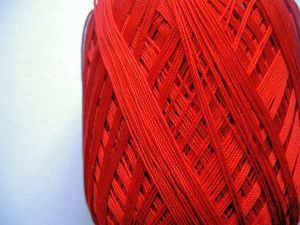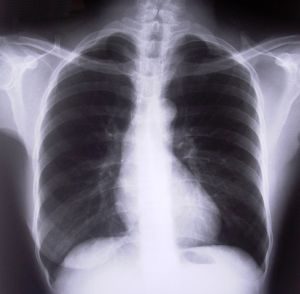1. Red wool cross
 An invitation for everyone to place a piece of red wool or red ribbon to a 5-6 foot cross made of willow sticks. The image of a fragile wooden cross ‘dripping in red’ is a very powerful symbol of Jesus bearing our mistakes/sins on the cross.
An invitation for everyone to place a piece of red wool or red ribbon to a 5-6 foot cross made of willow sticks. The image of a fragile wooden cross ‘dripping in red’ is a very powerful symbol of Jesus bearing our mistakes/sins on the cross.
You will need: a cross made out of 5-6 foot willow sticks strapped with black tape or cable ties to a microphone stand to make it self-supporting, at least one length (20 inch/45 cm) of red wool for each person, music (optional).
Give everyone a piece of red wool and invite people to use it to represent something that has gone wrong or is broken – red symbolising the colour of blood, warning and guilt. Spend some time in silence or listening to an appropriate piece of music. Very often, we rush our prayers, rush through a service, rush, rush, rush … and there are just too many words. Here is an opportunity to take plenty of time praying and talking to God (between 5-15 minutes or longer). This time of silent prayer must not be rushed.
The invitation is given at the beginning that when people are ready to release their prayer to God, they can make their way forward to to tie their piece of red wool to the willow cross. It never ceases to amaze me the creative ways people use to attach their wool – some plait them, some make lots of knots, some weave them amongst the willow.
A fragile cross dripping in ‘red’ (which becomes symbolic of the blood of Christ) is a very powerful and potent symbol. The beauty is that all have contributed, each piece has been creatively placed, and each person knows where their piece is within the whole. It’s allowing individual expression within the corporate act without demanding conformity. When all have tied their red wool onto the cross, the leader then leads a prayer of assurance of forgiveness and/or absolution appropriate for your group. It could be as simple as:
Though our sins may be as scarlet, they shall be as white as snow.
May you know the transforming gift of God’s mercy and grace now and for ever.
Amen.
or
God our Father, who forgives all who truly repent,
Have mercy on you/us,
Pardon and deliver you/us from all your/our sins,
Confirm and strengthen you/us in all goodness,
And keep you/us in eternal life
Through Jesus Christ our Lord.
Amen.
This idea has been adapted by Sally Thornton from an original idea by Canon Peter Craig-Wild.
2. A meditational breathing exercise on forgiveness
 A simple meditational prayer exercise to help us accept/breathe in God’s forgiveness and to forgive ourselves as we slowly breathe out.
A simple meditational prayer exercise to help us accept/breathe in God’s forgiveness and to forgive ourselves as we slowly breathe out.
More info
Many of us at some point in our lives feel the need to be forgiven and to forgive ourselves. Yet it is easy to feel trapped, unable to get past mistakes we have made and the scars they leave with us and others. At the heart of the Christian tradition is forgiveness – forgiveness from God and God’s help in allowing us to forgive ourselves and to change.
This exercise uses our breathing to help us accept God’s forgiveness and to forgive ourselves.
Breathing exercise
Find a quiet place where you can sit and relax. Take a moment to quiet yourself and to breathe deeply. You may find it helpful to light a candle to remind you of the presence of God.
Begin to take notice of your breathing – as you breathe in and as you breathe out.
Focus on the issue which you feel is burdening you. And then as you slowly breathe in and out, pray these prayers. Think of the burden when you breathe out and God’s forgiveness and acceptance of you when you breathe in. Appropriate instrumental music may be helpful (not a song as the words will muddle with the one who is leading). The leader needs to lead/read slowly.
Breathe in love
Breathe out hateBreathe in acceptance
Breathe out separationBreathe in forgiveness
Breathe out blameBreathe in peace
Breathe out anxietyBreathe in life
Breathe out deathBreathe in gentleness
Breathe out tensionBreathe in God’s presence
Breathe in God’s acceptance and forgiveness
For more information, read Jonny Baker’s blog post.
3. Broken twigs / crown of thorns
 This works great in autumn/winter time as the twigs are dry, with very little sap or moisture in them, and so will ‘snap’ with a distinctive sound. Why not organise a group to go collecting enough twigs for everyone to have one or two twigs each? (If the twigs are still a little wet, try standing them up on their ends in a wide-mouthed jar/vase in a warm/dry room for a couple of weeks and they should dry out sufficiently.
This works great in autumn/winter time as the twigs are dry, with very little sap or moisture in them, and so will ‘snap’ with a distinctive sound. Why not organise a group to go collecting enough twigs for everyone to have one or two twigs each? (If the twigs are still a little wet, try standing them up on their ends in a wide-mouthed jar/vase in a warm/dry room for a couple of weeks and they should dry out sufficiently.
You will need: enough twigs for everyone to have one or two twigs each, chilled reflective instrumental music (songs with words are too distracting at this point).
Have a good reader recite Psalm 51.1-16 slowly.
Long pause
Then read Psalm 51.17:
The sacrifices of God are a broken spirit; a broken and contrite heart, O God, you will not despise.
Invite everyone to break their twigs in two.
My brokenness,
leads me back to you.
Renew my heart.
My esteem matters not.
Not my will but yours be done.
Into your hands I commit my spirit.
Take it further
You could do this during Lent/Holy Week, where after the prayer you could invite everyone to come and stick their broken twigs into a pre-prepared circular Oasis from a florist to create a crown of thorns. Or you could twist and weave some longer branches into a rough circle, then invite everyone to insert their broken twig into the circle of branches.
4. Parsley and salt – downcast (Luke 24.17-18)
 You will need: some sprigs of parsley, bowls of salt water, music (optional).
You will need: some sprigs of parsley, bowls of salt water, music (optional).
You can either lead this centrally with one table in the middle, or you can set up a number of tables around the room for people to visit at the appropriate time. On the table(s): simply some sprigs of parsley and a glass bowl of salt water.
What has made your soul downcast this week? Spend some time silently reflecting on ways in which you have wounded your life, the lives of others and the life of the world. When you are ready, take some parsley, dip it into the salt water and eat it. The salt water represents tears of repentance; the parsley represents new life that will grow. Say a prayer of confession prayer together, maybe from one of the Iona liturgies or just something like this:
Lord, we ask for your forgiveness
For all the ways we have wounded this week,
For our careless thoughts,
For our thoughtless deeds,Breathe your life once more into our tired and weary lives,
That the wounds may heal
To the Glory of your name.
Amen
Adapted from Communion by Numbers by the alternative worship community Grace.
